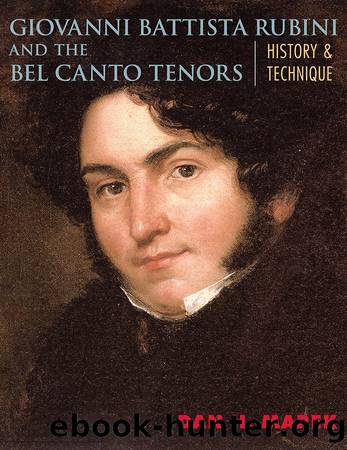Giovanni Battista Rubini and the Bel Canto Tenors by Dan H. Marek

Author:Dan H. Marek [Marek, Dan H.]
Language: eng
Format: epub
Publisher: Scarecrow Press
Published: 2013-08-15T00:00:00+00:00
15
Operas and Concerts in London and Paris, 1836â1839
1836
After a Christmas break, the 1835â1836 season at the Italien resumed with a performance of Otello with Rubini in the title role on January 19. Marino Faliero, Teobaldo in I Capuleti e i Montecchi, and Don Giovanni followed in February and March. On March 22, Rubini sang the premiere of Ermano in Saverio Mercadanteâs I briganti, along with the other three members of âThe Great Quartet.â In spite of their best efforts, I briganti was a failure, but the experience in Paris was salutary for Mercadante. He changed his style and became the most important composer of the primo ottocento after Rossini, Donizetti, and Bellini and had a considerable influence on the young Verdi.
Then, for Rubini, it was off again to the Kingâs Theater in London (thatâs where the money was!) On April 9, the season opened with La gazza ladra. Other familiar works followed: Mosé in Egitto, I puritani, Il barbiere di Siviglia, La sonnambula, Otello, Lâassedio di Corinto, Marino Faliero, Anna Bolena, Gneccoâs La prova dâun opera seria, Don Giovanni, and I briganti. Despite being a fan of âThe Puritani Quartetâ Chorley dismissed the whole season of 1836 with the following volley:
There was no novelty this year of much importance, either among the works performed or those who performed them.
I Briganti, by Signor Mercadante, commissioned for Parisâas an opera by Bellini, and as another by Donizetti, before it had been commissionedâfailed to please here; in this following the fate of all its clever composerâs operas on our side of the Alps.
The music was well made. Rubini had a beautiful cantabile in the second act, but the transformed version of Schillerâs Robbers proved merely a âTransformed Deformed.â1
For all that, the 1836 season in London offered a very interesting schedule of concerts at the Kingâs Theater. For example, on May 2, besides Rubini, the singers were Grisi, Malibran (who did not participate in the Italian opera season), Lablache, Tamburini, Clara Novello (1818â1908), and Michael Balfe (1808â1870), an Irish composer, violinist, and also a fine baritone. Balfeâs opera The Maid of Artois, based on the story of Manon Lescaut, was written for Malibran and premiered in London on May 27, 1836. Apparently, Rubini had begun teaching in his frequent trips between Paris and London, for the following revue appeared in The Musical World for 1836:
A young English lady, Miss Isabella Trotter, a pupil of Rubini, has been singing twice last week, at the concerts of M. M. Sowinski and Profetti (in Paris). The beauty and extent of her voice, which nature has endowed with the rarest qualities, will doubtless be much improved by cultivation, so as to place her, at no distant day, at the head of her profession.2
Miss Trotter also appeared with Rubini and the other members of the âPuritani Quartetâ as supporting artists (a prevalent practice of the time) in concerts given by Segismond Thalberg, (1812â1871), one of the greatest pianists of the nineteenth century and Ole Bull (1810â1890), the celebrated Norwegian violinist.
Download
This site does not store any files on its server. We only index and link to content provided by other sites. Please contact the content providers to delete copyright contents if any and email us, we'll remove relevant links or contents immediately.
The Goal (Off-Campus #4) by Elle Kennedy(13643)
Kathy Andrews Collection by Kathy Andrews(11797)
Diary of a Player by Brad Paisley(7540)
Assassin’s Fate by Robin Hobb(6189)
What Does This Button Do? by Bruce Dickinson(6188)
Big Little Lies by Liane Moriarty(5775)
Altered Sensations by David Pantalony(5090)
Pale Blue Dot by Carl Sagan(4987)
Sticky Fingers by Joe Hagan(4178)
The Death of the Heart by Elizabeth Bowen(3597)
The Heroin Diaries by Nikki Sixx(3536)
Beneath These Shadows by Meghan March(3293)
Confessions of a Video Vixen by Karrine Steffans(3292)
How Music Works by David Byrne(3249)
The Help by Kathryn Stockett(3130)
Jam by Jam (epub)(3069)
Harry Potter 4 - Harry Potter and The Goblet of Fire by J.K.Rowling(3048)
Computational Linguistics and Intelligent Text Processing: 20th International Conference, CICLing 2019 La Rochelle, France, April 7â13, 2019 Revised Selected Papers, Part I by Alexander Gelbukh(2975)
Strange Fascination: David Bowie: The Definitive Story by David Buckley(2848)
